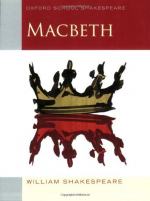|
This section contains 1,405 words (approx. 5 pages at 300 words per page) |

|
Macbeth: a Tragic Hero
Summary: Macbeth can be truly classified as a tragic hero after interpreting Aristotle's definition and applying it to Macbeth's character. Throughout the play, Macbeth is seen as an out of control ranging mad man that is out to achieve his grievous self indulging ambitions. In the long run he struggles, but cannot fight the inevitability of his demise.
Tragedy occurs to some more often to others, but most define it differently. Webster's Dictionary defines it as "a kind of drama in which some fatal or mournful event occurs" (764). To philosophers and traditional writers philosophy takes on another meaning. For example, to famous philosophical figure Aristotle, "tragedy occurs when noble or great persons are led, through pride or a secret flaw in their personalities, to suffering that changes their fortune. The tragic hero must begin in a high position and end in death or some sort of degraded role" (Definitions of Tragedy). Based on human nature, Aristotle's philosophy of tragedy, and current literary criticism of Shakespeare's Macbeth, the main character, Macbeth, is classified as a tragic hero.
Born in 384 B.C. at Stagirus, well known philosopher Aristotle was a student to Plato for over twenty years. Growing up on this Greek Colony and attending lectures, he acquired...
|
This section contains 1,405 words (approx. 5 pages at 300 words per page) |

|


